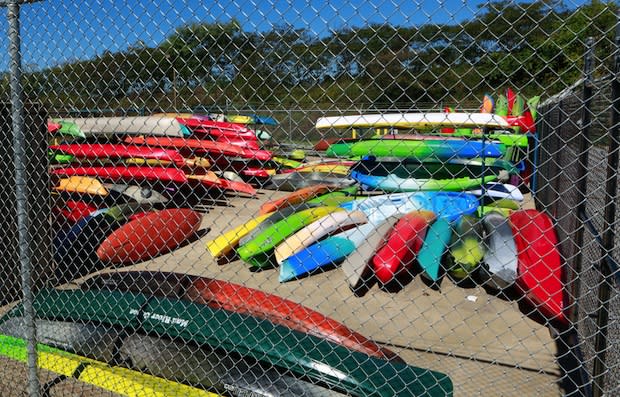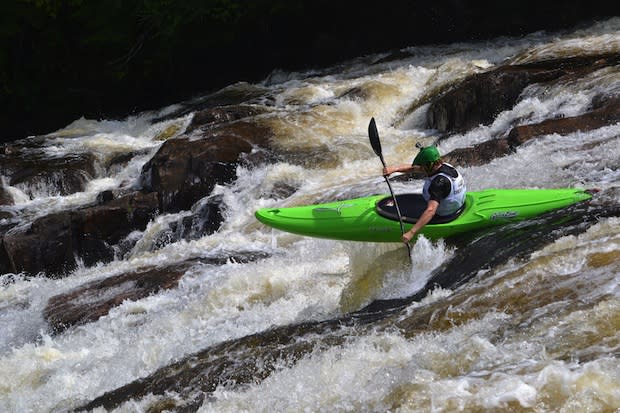Confluence Charts New Direction In South Carolina Paddling Country
You won't find a river running behind the factory of Confluence Outdoor in Greenville, South Carolina-but you will find something just as dear to any watersport enthusiast's heart. Tucked behind the building is an industrial chain-link fenced enclosure, overflowing with 100 kayaks and canoes in almost every shape, size and color the company makes.
This is the "boat shop" where the company's 425 workers can sign out boats of their liking for as long as they want. They can venture out on the waters of the Reedy River, a 15-minute drive away, or as far as their paddles will take them.

On Friday afternoons, it's a mad scramble. A parade of vehicles exits the parking lot with kayaks strapped to roofs and others with canoes jammed into the back seat with the bows poking out the windows.
It's a scene that makes sense to Sue Rechner, who took over as CEO of the company nearly seven years ago. She knows Confluence is filled with diehard paddlers who are disciples of paddle sports. They get paid to make the kayaks and canoes they love to play in. "Because a lot of them are outdoor enthusiasts and a lot of them are kayakers, all of that passion comes out in the product that they create," she says.
These overgrown, but experienced, kids who race to hit the boat shop every Friday have the same gratitude and respect for Rechner. She's turned their company around and has set a course for the company that could make it a world leader not just in kayaks, but also in the larger outdoor recreation industry.

Chapter One: A CEO Named Sue
When Rechner arrived at Confluence in December 2007, it was headed in the wrong direction and losing "buckets of money," she says. While the exploding popularity of kayaking meant sales were steady, the company lacked discipline and had lost significant credibility with retailers, suppliers and partners.
Over the years, Confluence had brought eight brands under one roof. The move had led to manufacturing confusion and slips in quality as molders and assemblers had to learn new models.
Rechner was ready for the challenge of fixing Confluence. She loved resurrecting heritage brands. At Victorinox Swiss Army, where she was CEO before joining Confluence, she had successfully re-launched the declining Swiss Army watch business and added apparel to the product line.
Confluence was much smaller and the career move was a lateral one. But it was a place where she could find meaning in a job that combined her love of the outdoors with a company desperately in need of her leadership skills.
Rechner knew the key to the company were the paddling enthusiasts who made up the devoted and knowledgeable workforce. Instead of overhauling the entire management team, she brought in just two colleagues from outside the company to help her.
Fellow New Jersey native Shelly Moore took over sales and Cheri McKenzie came on to lead marketing. The three women had worked together at Swiss Army, and Rechner and Moore had worked together at the Movado watch brand.
The first thing Team Rechner did was make sense of Confluence's eight brands, which had been brought together over more than 40 years of acquisition by several different companies. Confluence was born out of these companies in 1998 and included well-known boat brands such as Perception, Wilderness Systems and Mad River Canoe.
Rechner defined the brands precisely. Perception, created in the early 1970s, is for stillwater paddling and is great for beginners and families. Wilderness Systems is for sea kayaking and Wave Sport caters to the daredevil sport of whitewater kayaking.

The next step was fixing the manufacturing process. She needed to keep costs down, maintain the best boat quality and increase the number of boats that are made in what is lovingly called the "boat bakery" at Confluence's 453,000-square-foot factory-a former Hitachi television tube factory-that it moved into three years ago.
The "boat bakery" nickname comes from the process of building a kayak. They all start as colorful resins poured into more than 200 different aluminum boat molds to cover Confluence's extensive range.

They are baked in specialized ovens, constantly rotating, for short periods of time. Then, when the temperature drops they are removed from their molds to cool. The insides are stuffed with inserts to keep their shape and then they are trimmed by hand. The factory floor is often covered with long, loose strings of colored plastic shavings. These are recycled, dyed black, and used to make other parts.
Chad Trotter, who manages the molding process, started mixing resins at Confluence in 1990 right out of high school. Back then, he says, they could bake about 32 boats during a good eight-hour shift. Today with Rechner's improvements and better technology they put out hundreds.
To hit that number, or even higher, under Rechner's watch a boat is always in prep, another's in the oven, and a third boat is cooling at all times. The brand logos are now included in the molding process, a change that shaved two full days off the manufacturing time because boats don't have to cool down before the logo is applied.
Assembly lines to finish the boats once served single product lines. Now, any boat can move down any line, eliminating assembly down time.
Boats are produced on machines called turrets. A small single turret can produce 12 boats in an eight-hour shift. The world's largest, which Confluence designed with the machine's manufacturer, produces many more boats and looks like an amusement park ride as it weaves and bobs. The company allows visitors to see this behemoth, but how Confluence uses it is the proprietary secret sauce. No photographs are allowed.
All those changes drew the attention of the private equity firm J.H. Whitney, based in New Canaan, Connecticut, which bought Confluence this past April. But before signing the deal, the firm's managing director Paul Vigano says he had Rechner and her management team commit to staying with the business.
"Sue has the skillset to run a billion-dollar business," Vigano says. "She's really passionate about the outdoors. The industry really needs people like her."

